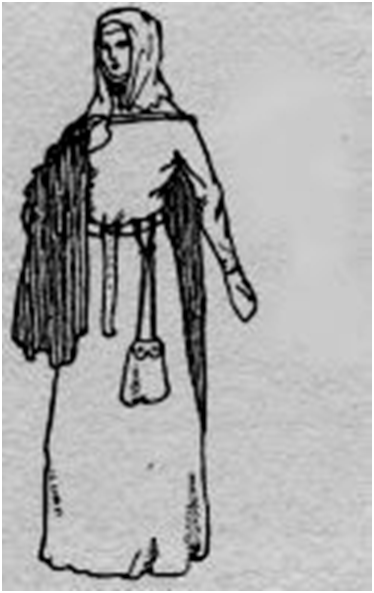The woman shall not wear that which pertaineth unto a man, neither shall a man put on a woman’s garment: for all that do so are abomination unto the LORD thy God. Deuteronomy 22:5
Whose adorning let it not be that outward adorning of plaiting the hair, and of wearing of gold, or of putting on of apparel; but let it be the hidden man of the heart, in that which is not corruptible, even the ornament of a meek and quiet spirit, which is in the sight of God of great price. 1 Peter 3:3-4
In like manner also, that women adorn themselves in modest apparel, with shamefacedness and sobriety; not with broided hair, or gold, or pearls, or costly array. 1 Timothy 2:9

I say, then, that man requires clothes for nothing else than the covering of the body, for defense against excess of cold and intensity of heat, lest the inclemency of the air injure us. And if this is the object of clothing, see that one kind be not assigned to men and another to women. For it is common to both to be covered, as it is to eat and drink. Clement of Alexandria (A.D. 195) Ante-Nicene Fathers vol.2 pg.264
In short, I find no dress cursed by God, except a woman’s dress on a man: for “cursed,” said He, “is every man who clothes himself in woman’s attire.” Tertullian (A.D. 198) Ante-Nicene Fathers vol.3 pg. 71
Then, too, as in His law it is declared that the man is cursed who attires himself in female garments, what must be His judgment of the pantomime, who is even brought up to play the woman!Tertullian (A.D. 198) Ante-Nicene Fathers vol.3 pg.89
Nay, there is more than this: for even Christ, we shall find, has ordinary raiment; Paul, too, has his cloak. Tertullian (A.D. 198) Ante-Nicene Fathers vol.3 pg. 97-98
But if any necessity arises, commanding the presence of married women, let them be well clothed–without by raiment, within by modesty. Clement of Alexandria (A.D. 195) Ante-Nicene Fathers vol.2 pg.252
For these superfluous and diaphanous materials are the proof of a weak mind, covering as they do the shame of the body with a slender veil. For luxurious clothing, which cannot conceal the shape of the body, is no more a covering. For such clothing, falling close to the body, takes its form more easily, and adhering as it were to the flesh, receives its shape, and marks out the woman’s figure, so that the whole make of the body is visible to spectators, though not seeing the body itself. Clement of Alexandria (A.D. 195) Ante-Nicene Fathers vol.2 pg.265
Let the woman observe this, further. Let her be entirely covered, unless she happen to be at home. For that style of dress is grave, and protects from being gazed at. And she will never fall, who puts before her eyes modesty, and her shawl; nor will she invite another to fall into sin by uncovering her face. For this is the wish of the Word, since it is becoming for her to pray veiled. Clement of Alexandria (A.D. 195) Ante-Nicene Fathers vol.2 pg.290
Touching modesty of dress and ornamentation, indeed, the prescription of Peter likewise is plain, checking as he does with the same mouth, because with the same Spirit, as Paul, the glory of garments, and the pride of gold, and the meretricious elaboration of the hair. Tertullian (A.D. 198) Ante-Nicene Fathers vol.3 pg. 687
You call yourself wealthy and rich; but Paul meets your riches, and with his own voice prescribes for the moderating of your dress and ornament within a just limit. “Let women,” said he, “adorn themselves with shamefacedness and sobriety, not with broidered hair, nor gold, nor pearls, nor costly array, but as becomes women professing chastity, with a good conversation.” Also Peter consents to these same precepts, and says, “Let there be in the woman not the outward adorning of array, or gold, or apparel, but the adorning of the heart.” …and draw the sighs of young men after you, nourish the lust of concupiscence, and inflame the fuel of sighs, so that, although you yourself perish not, yet you cause others to perish, and offer yourself, as it were, a sword or poison to the spectators; you cannot be excused on the pretense that you are chaste and modest in mind. Your shameful dress and immodest ornament accuse you; nor can you be counted now among Christ’s maidens and virgins, since you live in such a manner as to make yourselves objects of desire. Cyprian (A.D. 250) Ante-Nicene Fathers vol.5 pg.432
